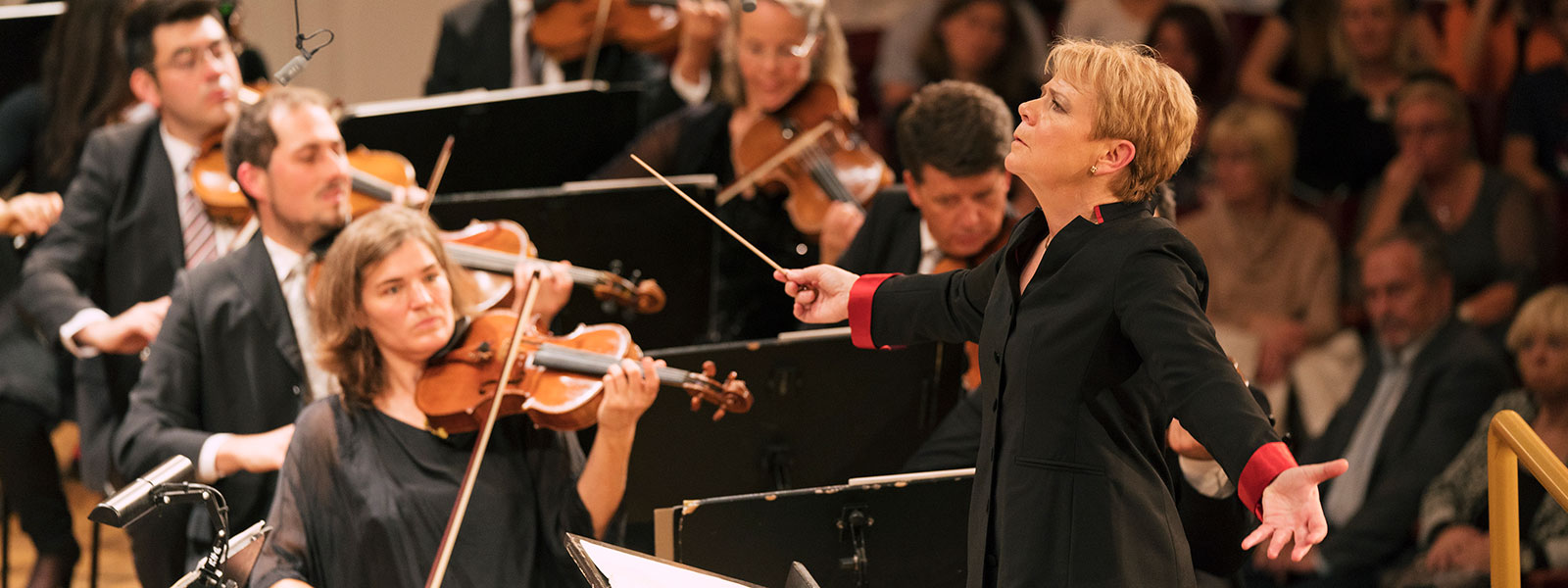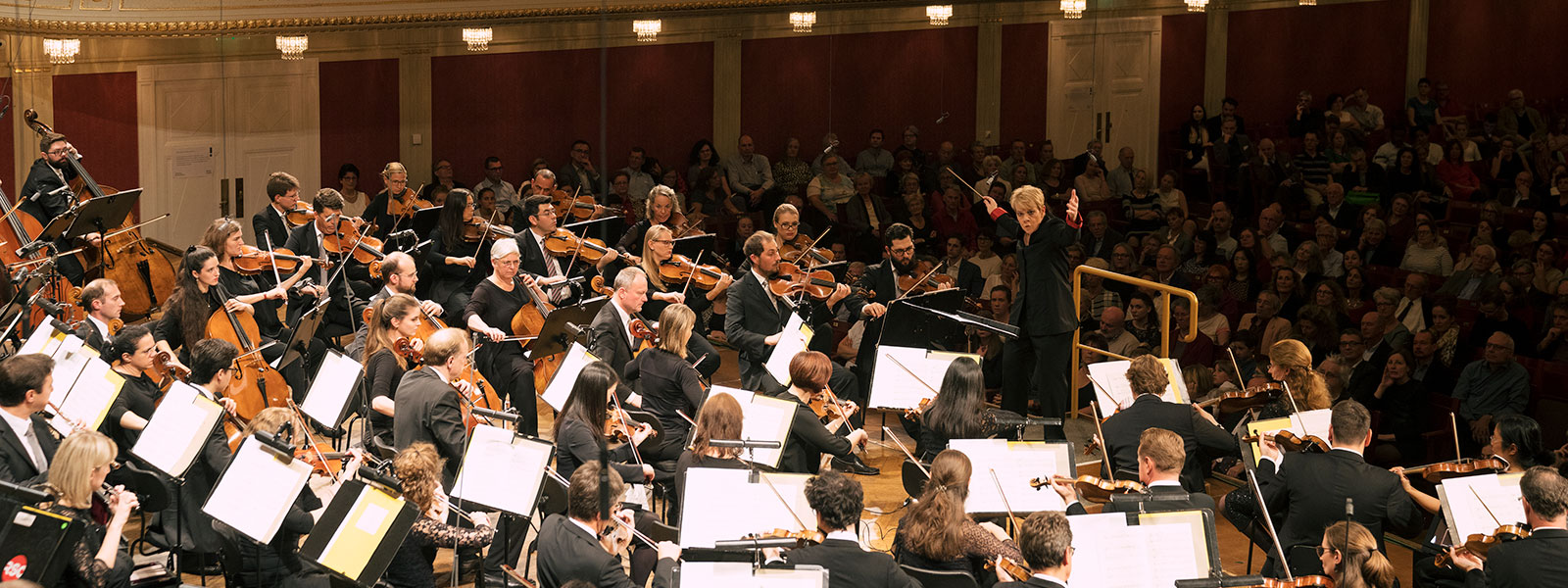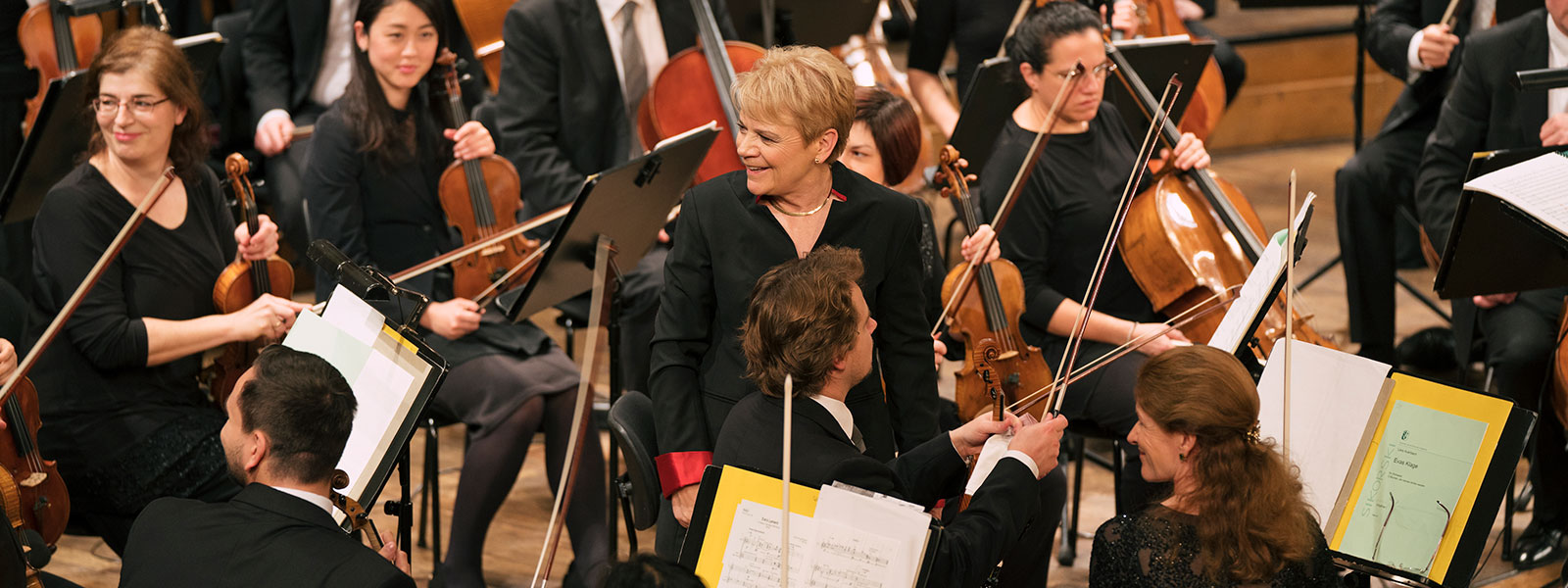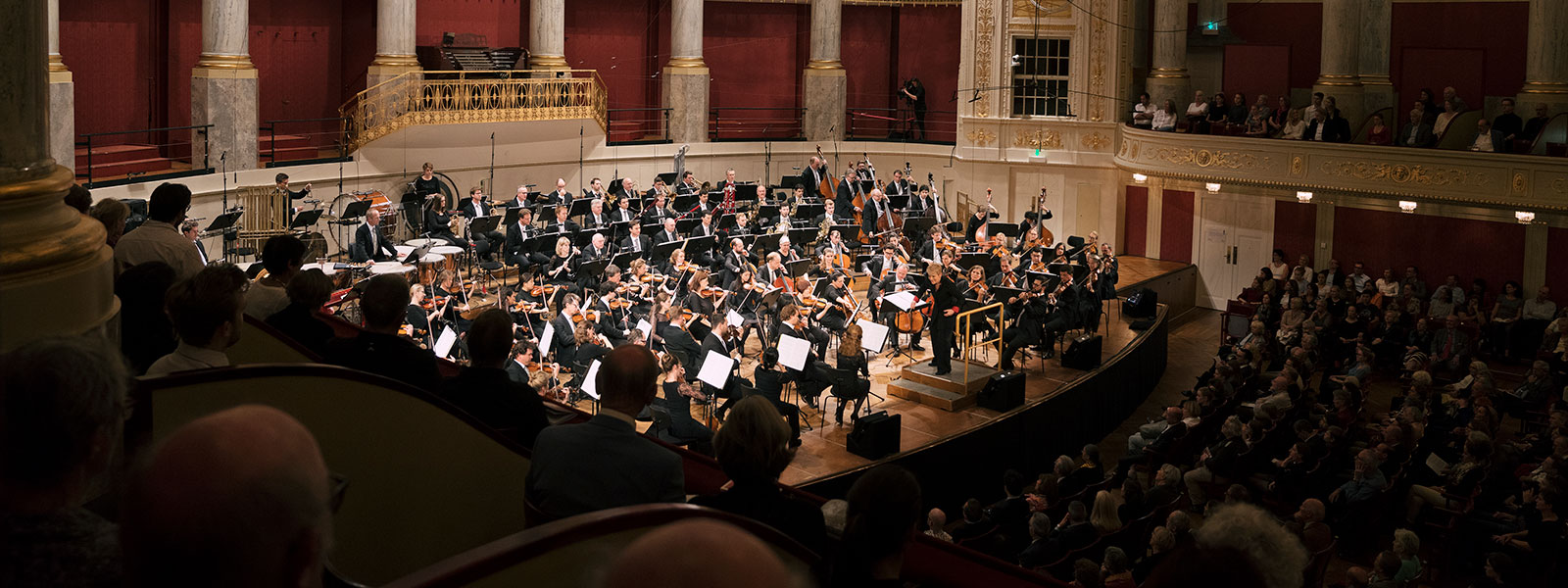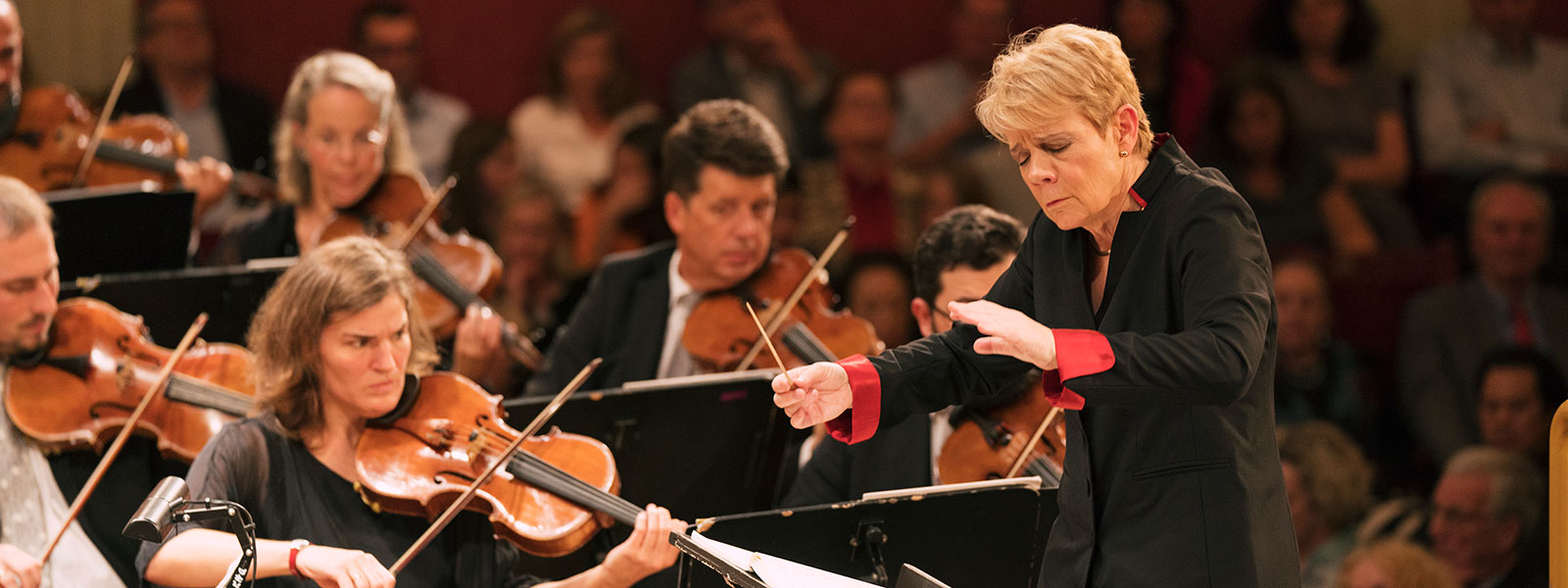Marin Alsop
The views and opinions expressed by speakers and presenters in connection with Art Restart are their own, and not an endorsement by the Thomas S. Kenan Institute for the Arts and the UNC School of the Arts. This interview has been edited for length and clarity.
Marin Alsop is one of the world’s most accomplished and respected symphonic conductors. She recently assumed the title of Music Director Laureate and OrchKids Founder of the Baltimore Symphony Orchestra after having led the renowned institution through a 14-year tenure that included its first European tour in 13 years, multiple award-winning recordings and more than two dozen world premieres. In 2020 she was also named Chief Conductor and Curator of Chicago’s Ravinia Festival, a position she’ll maintain as she continues her tenure as Chief Conductor of the ORF Vienna Radio Symphony Orchestra and as she enjoys the title of Conductor of Honour of Brazil’s São Paulo Symphony Orchestra after having led it as its Music Director for seven years.
Marin is admired not only for her conducting skills but also for her commitment to making classical music — from the classic repertoire to contemporary work — accessible and enjoyable to as broad an audience as possible, an aim for which she was granted a MacArthur “genius” Fellowship, the first conductor to receive the prestigious honor. One of her proudest accomplishments has been the founding of the celebrated OrchKids program at BSO, a year-round, during and after school, music program designed to create social change and nurture promising futures for youth in Baltimore City neighborhoods. OrchKids currenty works with ten schools in Baltimore City, serving over 1,600 children from Pre-K through 12th grade.
Marin broke a glass ceiling when she became the first woman to lead a major American orchestra, and she has worked hard to ensure that plenty of women follow her into the profession. In 2002 she created a fellowship to mentor, support and promote women conductors as they advance in their professional careers. The Taki Alsop Conducting Fellowship can now proudly boast that 18 of its laureates are now leading orchestras all over the world.
In this interview with Rob Kramer and Pier Carlo Talenti, Marin describes how the events of 2020 have served as a wakeup call for orchestras all over the world to jump-start innovation programs that had been on the back burner for far too long.
Choose a question below to begin exploring the interview:
- Before we start talking about the events of this past year, let’s look forward. What project in 2021 are you particularly looking forward to?
- So 2020 clearly created a lot of disruption in the arts, of course. Do you get a clear sense of what those disruptions did to your field and what you’d like to see change in the field as a result?
- You mentioned the digital platform. Are there other ways that you imagine your field evolving as a result of the events of 2020?
- You’ve headed several organizations and orchestras in your career. What in the future might keep these institutions financially above water? What might need to change to make sure they can survive the next crisis?
- How do you sustain momentum? How do you get people’s buy-in to want to continue on that track and not fall into the old habits of just going back to the way things were?
- You mentioned that this was the time to entertain crazy ideas for reinvention, moving forward. What’s the craziest idea this past year that you or someone you work with came up with that you admire and that was successful?
- This is a future-focus question — if you had three magic beans and you could apply them in any way towards creating change or new innovations or changing people’s minds, what would be three ways you would apply these three magic beans?
- You said we have a crisis of courage. I’m wondering, in your opinion, what would it take to make even, say, a 10% improvement in the courage factor?
- Where did your courage as a leader come from?
- What would you tell a young female conductor coming up through the ranks right now? What advice do you think would be most useful to her in this new landscape?
Pier Carlo Talenti: Before we start talking about the events of this past year, let’s look forward. What project in 2021 are you particularly looking forward to?
Marin Alsop: Oh, I have a lot of exciting projects to look forward to. There’s a global project I was launching in 2020 to celebrate the 250th anniversary of Beethoven’s birth called “The Global Ode to Joy.” All of my partner organizations on six different continents didn’t want to let the project go, especially at this moment in human history where unity and tolerance and joy are so important, so I’m pursuing that project again, still on six continents, which is very exciting. It’ll launch in ’21 in Vienna, on April 15th. It’s a re-imagining of Beethoven’s Ninth Symphony with new texts and new music added between the movements. It’s very exciting.
Pier Carlo: And it will be done simultaneously, globally?
Marin: No, it won’t be simultaneous, because each project is entirely different, has a different text, has different interstitial music, because we’re trying to capture the flavor and the character of each community in which it’s performed. So it’s different everywhere. It’s very exciting.
Pier Carlo: Which is why you have different texts in each location. Interesting.
Marin: Exactly. So that’s one project.
But I think I speak for everyone when I say just getting back in the concert hall and feeling each other, feeling the orchestra, feeling the sound, feeling the audience reaction, I think that’s what we’re all longing for in whatever form it takes.
Rob: So 2020 clearly created a lot of disruption in the arts, of course. Do you get a clear sense of what those disruptions did to your field and what you’d like to see change in the field as a result? Are there any aspects of the system that you’d want to reinvent or fix?
Marin: I think it’s been devastating for a lot of artists, and that’s extremely disheartening and distressing.
Maybe I was just born this way or maybe it is having been sort of a lonely woman in this field for so long, I really try to look at the upside always and try to envision the possibilities that can come from adversity. The things I see are very encouraging.
I really am a great believer in demystifying art so that everyone feels an ownership and an access and a sense of inclusion.
I’ve long been an advocate for online digital content and having the ability to connect with a broader audience in a more casual way. I really am a great believer in demystifying art so that everyone feels an ownership and an access and a sense of inclusion. I think this really catapulted finally at least my field, orchestral music, into not just considering but actually implementing digital concerts, digital content, starting to think about all of those things that I think the classical music world was resisting for as long as possible. So I see a huge upside of keeping that connection and that outreach as part of our broader picture.
Pier Carlo: And how do you think that will translate to getting more audiences in seats once the pandemic is over?
Marin: Well, I think this is a big question, how comfortable will people be getting back into the concert hall? I think there’s a huge hunger for people that love the live music experience to get back and to reconnect with that, but I think there’s a fear factor. It’s been somewhat ironic, I think, that countries have opened bars and restaurants and gyms but not concerts, classical music concerts. I don’t think there’s any more danger. It seems much less dangerous to me, frankly, to be sitting quietly and partaking in a concert.
Only time will tell, but I do believe that people will long for the gathering experience. I certainly feel almost as though I’ve experienced a sensory deprivation from not being able to connect with my friends. So I think there could be a real upside to it and a real resurgence in human participation, in human connection, in human gathering.
But we’ll have to make sure that people are safe, of course. How long will that take? Whether it will be six months or a year, that’s a big difference, and arts organizations will need to really hold on and be able to sustain and survive through these times.
Rob: You mentioned the digital platform. Are there other ways that you imagine your field evolving as a result of the events of 2020? What’s your experience about the resistance that your field has to doing some of these changes?
Marin: I think that it has been a sticking point in a lot of contract negotiations, particularly in the United States. I think it’s a hangover from the old days of recording, where you could actually monetize for the players and for the orchestras’ recordings, but those days are long gone. So I think it was trying to hang on to a system that was outdated and really part of the past.
Sometimes out of desperation, great things come, and that’s how I feel about this. ... I think it’s really opened up the idea of how we connect through music, and I think this bodes well for the future.
I think that coming into the 21st century — [laughing] I mean, at least the 20th century, if not the 21st — for orchestras is a great step forward. It was such a quick ramp-up that I think everybody made a lot of mistakes, myself included, but we all learned together, and it felt like an all-hands-on-deck kind of approach to trying this. Sometimes out of desperation, great things come, and that’s how I feel about this. I’ve watched musicians grow into being real personalities, being able to communicate online, being able to reach out not just through their playing but also through their speaking.
I think it’s really opened up the idea of how we connect through music, and I think this bodes well for the future.
Pier Carlo: You’ve headed several organizations and orchestras in your career. What in the future might keep these institutions financially above water? What might need to change to make sure they can survive the next crisis?
Marin: Well, I think, at least from my perspective, there’s often a tendency when things are going along at a predictable rate to hang onto the system we know and to not innovate, to not evolve, to not have those discussions. I would say that this pandemic kicked all of that into gear: “OK, now let’s actually entertain all these crazy ideas. Let’s communicate with our players. Let’s see what their thoughts are.” I think there’s a much more vibrant and ongoing discussion now with the players. You have a wealth of brilliant artists on your roster who barely participate in the discussion process. I think this really opened that up.
My thought is and my hope is and my advice would be not to try to run back to what was but to try to stay on this path of discourse, innovation, inclusion. I think also the whole social movement finally about diversity and inequality and inequity in our field has been really a revelation, and it’s something that we’ve needed to address for a long time. I’ve been a huge, huge proponent of that discussion, of course, over the years, and here we are finally, again, catapulted into action.
My thought is, keep acting, keep moving forward, keep figuring out how we can change the future landscape, not how we can get back to the old landscape. Keep the things about the old landscape that were fantastic and move on, is my advice.
Rob: How do you sustain that kind of momentum? How do you get people’s buy-in to want to continue on that track and not fall into the old habits of just going back to the way things were?
Marin: [She laughs.] Yeah, well, that’s a good question. I think that you have to have great leadership, and that may vary. You have to have, I think, an urgency, and you have to not be complacent. Whether those characteristics and qualities are there, I don’t really know. It may vary from institution to institution. I’m sure it will, actually.
I think generally we’ve passed the tipping point. It’s not a toe in the water; we have a couple legs in the water now. I don’t see it going back. When the #MeToo movement broke out and suddenly people were clamoring to have women on the podium, I was so thrilled, but it was almost as though it had to build up for decades, centuries even, until suddenly something broke the wall, like the Berlin Wall coming down.
That was so unexpected, wasn’t it? Everybody’s like, “Oh, why didn’t this happen before? Who knew?” I feel the same way about women on the podium, that now we’ve passed the point where institutions are going to go back to the old way, because now women are part of the landscape, women of every color, every size, every age. This is what’s really critical.
Once you get things to that point … . I certainly hope that orchestras 10 years from now will look dramatically different and really reflect the makeup of the community in which they reside. At the moment, they don’t. I look forward to that future.
Pier Carlo: You mentioned that this was the time to entertain crazy ideas for reinvention, moving forward. What’s the craziest idea this past year that you or someone you work with came up with that you admire and that was successful?
Marin: Oh, wow. Let’s see. How crazy. I don’t know if they’re really crazy ideas. I think that they’re ideas born out of necessity.
To me, this is really a symbol for what music should be. It should be a refuge. It should be a comfort. It should be shared with everyone. And it should be shared with the people that need it the most, and they are often the people that can’t access it.
In Vienna, the Konzerthaus where I work frequently and perform, they’re really forward-thinking people. They started a program to get music out to the people. I think several communities have done that. I’ve heard different iterations of this throughout the world. Taking a truck that’s rigged to the places where people are isolated, whether it’s the nursing homes or the hospitals, and parking outside in the parking lot and performing for them. To me, this is really a symbol for what music should be. It should be a refuge. It should be a comfort. It should be shared with everyone. And it should be shared with the people that need it the most, and they are often the people that can’t access it.
I think in many ways that concept propelled me into one of my next big ideas. I don’t know if it’s a big idea, but I’ve worked with so many incredible musicians around the globe and I’ve met so many fellow musicians who share the same aspiration to be good citizens of the world and to use music as a healing force and a unifying force. So I gathered so far maybe 30, 40 of these incredible people, and we’ve started a new orchestra called The Global Orchestra. We’ve done a few projects online, but our goal is to really come together maybe once a year in a place where music really can impact the culture, the people, the situation.
We’re just starting to think about how to do that, but this is directly a result of the pandemic for me, because during this time I’ve connected globally with so many people that I normally wouldn’t come into contact with on a daily basis. I think in some odd way we’ve been able to connect, certainly not physically but online, in a way that never happened before, and that’s been very empowering.
Rob: It sounds like it’s opening up possibilities and new ways of thinking about how you, both individually and as a collective, globally approach the work. It makes me wonder — this is a future-focus question — if you had three magic beans and you could apply them in any way towards creating change or new innovations or changing people’s minds, what would be three ways you would apply these three magic beans?
Marin: If we’re speaking specifically about my field, I think that all concerts would be free. This is assuming it is possible. All concerts would be free to the public. Free, always free.
We would be able to quickly go to areas that are in need of music, whether it’s out to communities or to travel somewhere to perform. I think a flexibility is what I’m looking for, that we could really respond and emulate all these incredible first responders in a way, like be the artistic first responders. I’d love that.
And let’s see, the third one, I guess for me it would be about community engagement and involvement. This is a very specific dream: I’d love to see the super-talented kids from our OrchKids program here in Baltimore playing with the Symphony and create an apprenticeship program, so that it’s not just about artistic perfection but it’s also about giving back. Because this is really critical to me, I think, in the world we live in.
When my time is up, I want to not just think, “Ah, I did a lot in the field of music.” I want to feel that I connected on a broader plane, if possible.
Pier Carlo: Do you know of any symphonies or musical organizations around the globe that are accomplishing some of the things you just mentioned? Free concerts, this flexibility, being able to go out into the community?
Marin: I think of my colleague Iván Fischer and the Budapest Festival Orchestra. Iván is an amazing citizen of the world. He’s someone who stands up and is counted, even in the tough moments, which as we see from what’s happened recently in the United States … this is not the norm anymore. People need to have courage. We have a crisis of courage everywhere. He’s someone I admire tremendously. And his orchestra, the Budapest Festival Orchestra, it’s created in partnership with the players and in reaction to, I think, the rigidity and lack of flexibility in many unionized orchestras. I think that they’ve done a beautiful job.
There are a lot of younger groups coming up. I think of Eric Jacobsen and a group called The Knights. I’ve seen them do incredible projects and very spontaneous reactions. I’m sure there are hundreds of groups around the world doing these things to different degrees. I just wish that that would be the starting point for all of us, and then we could challenge each other to see how inventive and how creative and how connective we could be.
Rob: You said we have a crisis of courage. I’m wondering, in your opinion, what would it take to make even, say, a 10% improvement in the courage factor?
Marin: I think that we have to have leaders who are courageous and people in positions of leadership — I don’t say authority; it’s not the right word — people in positions of leadership who are supported to be courageous, not punished for being courageous. We have to let go of the system. If you live your life trying to support and prop up a system because it gives you personally what you want, your motivations are all askew. I really believe that having a supportive team around an innovative, forward-thinking leader can do wonders, but it’s a rarity for sure.
Pier Carlo: Where did your courage as a leader come from?
Marin: Oh, I don’t know. I think I was just born stupid. Or stubborn. [Laughing] I’ve always been stubborn; I think that’s it.
I think courage is something that we each develop in our own way. ... We need to set examples for young people that are not kowtowing to the wrong and are not trying to support systems of inequality but instead are promoting the kind of values that we want the world to reflect.
I think courage is something that we each develop in our own way. I do think that we’re all born with a certain tolerance for courage and a certain tolerance. Some people can take it, and some people can’t, and I respect that too. I don’t judge people based on that, but I do think that courage is something that we need to encourage in our children. We need to set examples for young people that are not kowtowing to the wrong and are not trying to support systems of inequality but instead are promoting the kind of values that we want the world to reflect.
One of the most important things to me is, where are the green orchestras? We have to be part of this climate discussion. We have to be part of the future. We have to be part of the important issues. Of course, art is always a reflection of important issues. How can we be part of the solution and be open to hearing other people’s opinions? That’s a very, very important thing. I find sometimes I’m too quick to judge. For this new year, which is such a spectacular relief to hit, I’m trying to be more of a listener and really, really be open to everybody’s ideas.
I think I try to live my life adhering to a philosophy that it was hard for me so that it could be easier for you. That’s how I try to live my life. The things that I discovered as a child, that piano was not my instrument. I hated the piano, and I retired when I was six years old. But the fact that I then picked up a violin six months later and fell in love with it made me realize every child needs to have that opportunity to find their instrument. This is just a small example.
That was one of the founding premises of the OrchKids Program, that kids get to try different instruments for six weeks at a time. I’ll never forget this young man named Tyrone. They brought in the basses, the double basses, and he ran to this double bass as though it was his long-lost twin brother. He knew that that was his instrument, which is highly unusual. That just reinforced my belief that every child needs to have access and the capacity to make choices for themselves. This is so important to me.
It’s very complex and very simple at the same time. The future is all about the young people. How do we want to invest in bringing them into what we do? They don’t have to be classical musicians at all, but music is an incredible vehicle for self-discovery, for imagination, for connecting, for conflict resolution, all of these things. And it’s non-partisan, which is fantastic! [She laughs.]
Pier Carlo: What would you tell a young female conductor coming up through the ranks right now? What advice do you think would be most useful to her in this new landscape?
Marin: Oh, I would say, “Fantastic. Congratulations. Your timing is excellent.” [She laughs.]
I would give the same advice to young women as I give to young men, which is that you have to be passionate about this. If there’s a moment in time when it’s not rewarding and you don’t love what you’re doing in an existential kind of way, don’t do it anymore. I really believe that there are callings for people, as well, and some are stronger than others. But I do think that we have to be led by passion and a driving commitment.
I’m very much a sort of Horatio Alger kind of person in that I believe that if you work really hard, you will succeed. I have no doubt about it. And success is something that I hate to measure because success for one person could be entirely different, could look entirely different from success for another person.
There are so many needs in the world. There are so many places, there’s so much room for everybody, that success doesn’t mean necessarily being the music director of the Baltimore Symphony. It can mean conducting a youth orchestra in your town with the kind of fervor and passion and commitment that changes all of these young people’s lives. To me, that person is as successful as I am.
January 25, 2021






